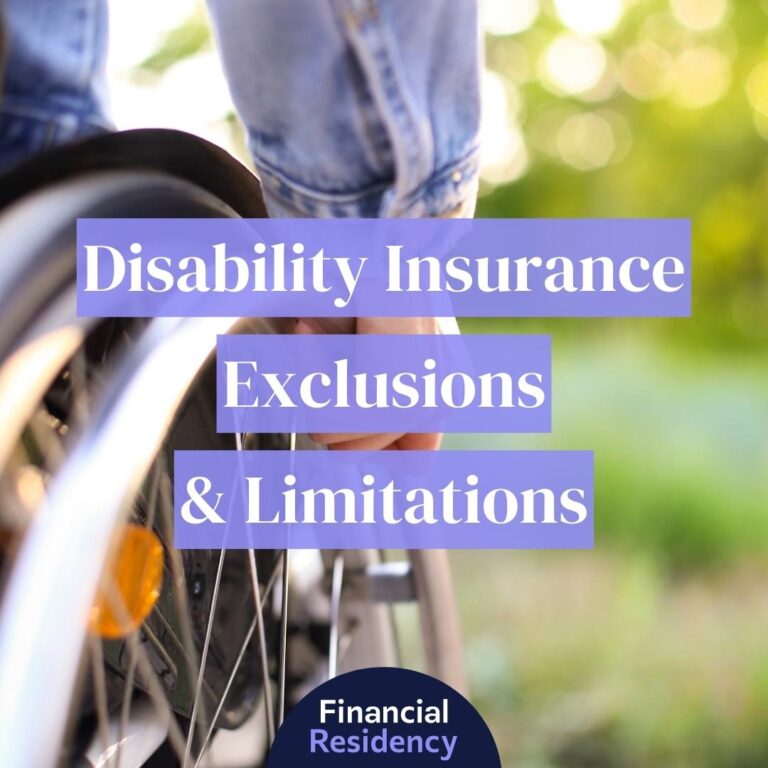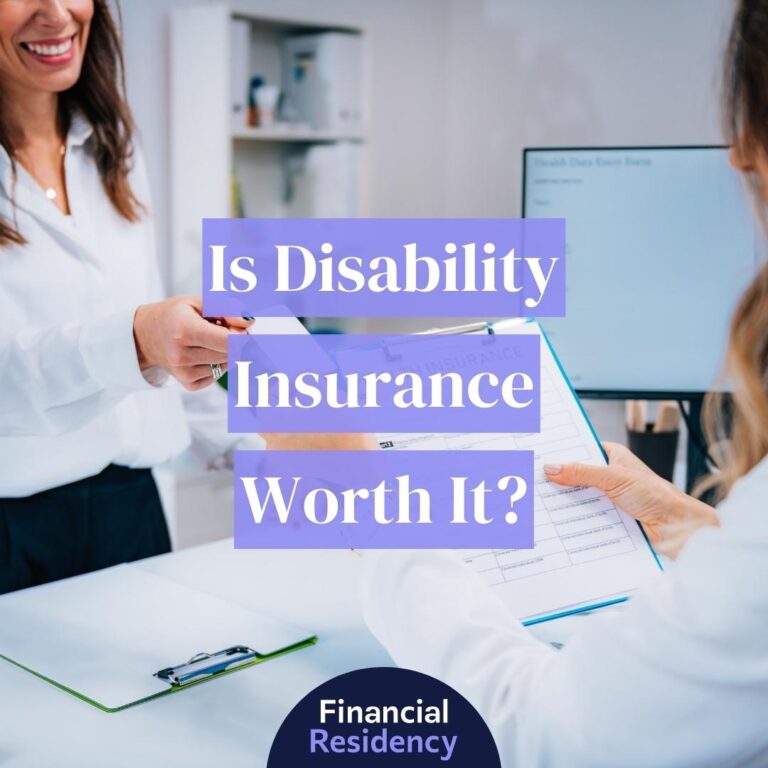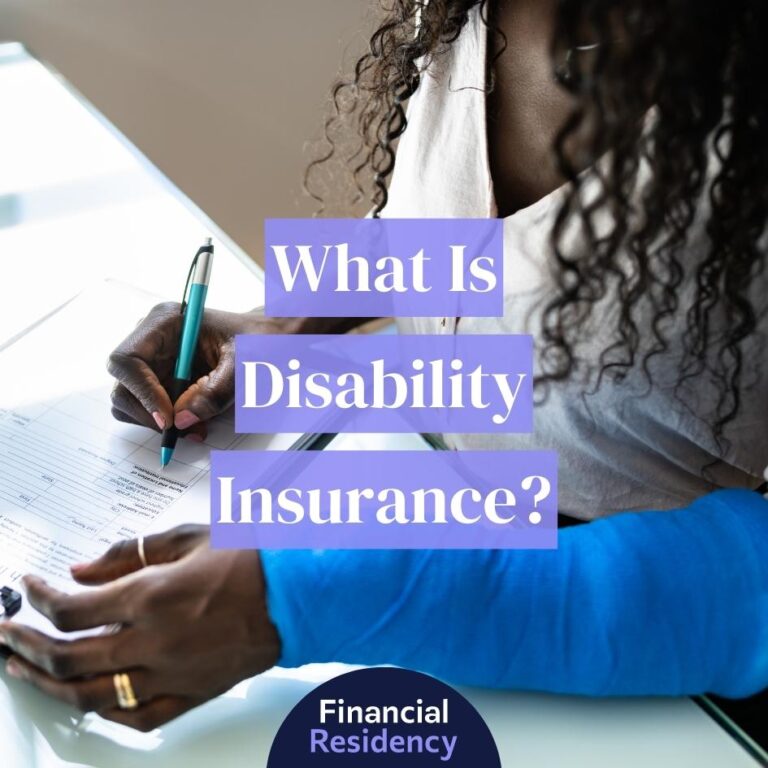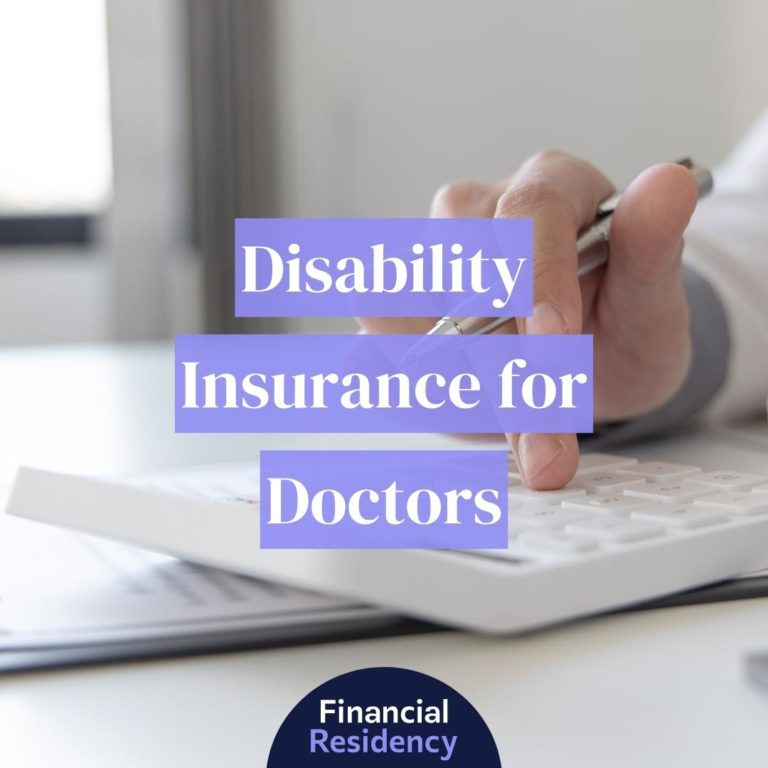If you’re the breadwinner in your family or want to protect your income, disability, and life insurance are essential.
It might sound like a lot of insurance, but both policies cover different occurrences while financially protecting you and your loved ones.
Importance of Disability and Life Insurance
Disability insurance and life insurance are income protectors. They protect you and your family should you become disabled or pass away. In both situations, you or your family still must pay bills, and having protection for the lost income is imperative.
Many people think disability and life insurance are interchangeable, or if you have one, you don’t need the other, but they protect different instances in your life.
For example, if you became chronically ill and could no longer see patients, your disability insurance would cover a percentage of the income lost for a specific duration or through retirement, depending on the policy.
However, if you die, your life insurance would pay your family a lump sum they can use to cover bills, pay debts, cover the cost of living, or pay for children to go to college.
Disability Insurance vs Life Insurance
Ideally, you should have a disability and a life insurance policy. Some life insurance policies may include a disability rider, which may cover your income temporarily if you’re disabled, but they aren’t nearly as robust as a standalone disability policy.
Disability Insurance
Disability insurance covers a percentage of your income if you become disabled. You may get group life insurance from your employer, but it’s usually insufficient to replace your income. Most residents, fellows, and doctors need additional disability insurance to protect them.
You have two choices for disability insurance, short and long-term.
- Short-term disability insurance – If you are disabled for a short time, less than one year, a short-term policy may cover your loss of income, usually up to 60% of your income.
- Long-term disability insurance – If you are disabled for longer than one year, long-term disability insurance could protect your income for a few years, or up to retirement, depending on the policy, covering up to 60% of your income.
You can purchase disability insurance policies that cover your own occupation or any occupation. Own occupation policies are more expensive but provide a payout if you cannot work your existing specialty. Any occupation policies cost less but only pay out if you cannot work any job, not just the area you specialized in during med school.
If you become disabled, you must file a claim with your insurance company, proving the disability. Each company has different requirements to determine if your disability warrants a payout and its duration.
Disability policies usually have an elimination period, or time you must wait after becoming disabled to receive payment.
Pros
- You can focus on getting better – When you don’t have to worry about how you’ll make ends meet, you can focus on your recovery. You won’t feel the need to rush back to work and risk your health because you need an income.
- You can meet your financial obligations – Losing your income could be detrimental to your family. Your bills don’t stop because you are ill or hurt. For example, if you don’t pay your mortgage or car, the bank can repossess them, but a disability policy can provide the funds needed to pay them.
- The income is tax-free – If you have an individual policy you use after-tax dollars to pay the premiums on, your payouts are tax-free (if you have an employer-paid policy, payouts may be taxable).
Cons
- It can be costly – The typical disability insurance policy costs 1% to 3% of your income. The older you get, or the more health problems you have, the more expensive it gets. It can be hard to afford the premiums if you’re in your residency, fellowship, or even the first couple years of your practice.
- You must rely on the insurance company for your status – Even though you think you’re disabled doesn’t mean the insurance company will agree. Each policy has different terms; if your disability doesn’t meet them, you may not receive a payout.
- Most policies have a waiting period – You may have to wait 30 days to 6 months before your disability benefits begin depending on your policy’s waiting period. You’ll need savings to cover the months you won’t get paid.
Life Insurance
Life insurance helps your family financially if you pass away within the policy’s term. You pay monthly premiums in exchange for a death benefit. When you die, the people you name as beneficiaries on the policy receive a lump sum payout.
There are many life insurance options, but the most common is term life which covers a specific period, usually 10 to 30 years. If you die within that time, your loved ones receive a tax-free payout to use however they need.
If you want something more long-term, consider a permanent life insurance policy. A couple of examples include whole or universal life. These policies provide a death benefit for your lifetime and an investment component. The premiums on permanent policies are much higher, but you grow a cash balance you can use for specific situations, such as disability or chronic illness.
You may also be able to borrow from the policy for certain situations, such as buying a house or paying for emergencies. If you don’t pay the balance back, the insurance company reduces the death benefit they pay your beneficiaries when you die.
Pros
- You can protect your family – If your family relies on your income, life insurance can protect them if you die. Instead of worrying about finances, your family can focus on grieving and handling their new life without you.
- There are affordable options – Term life insurance is usually affordable, especially if you get a policy in your younger years. This ensures you protect your family when they are the most vulnerable and when you have the least amount of savings.
- Provides peace of mind – Investing in life insurance ensures that your family will be cared for no matter what life throws your way.
Cons
- You must pass underwriting – To get approved for most life insurance policies, you must undergo underwriting and pass. For example, if you have past medical issues or a dangerous lifestyle, you may not get approved, or if you do, the premiums may be high.
- You pay for benefits you’ll never see – The benefits you pay for are for your family. Unless you have a permanent life insurance policy with a cash value, you can’t use the funds while alive, even if you become disabled.
- It can be expensive if you wait – Waiting to purchase life insurance until later in life increases your premiums. The older you are and the more health issues you have, the harder it is to afford the premiums if you get approved.
Purchasing Disability and Life Insurance Simultaneously
The best time to purchase disability and life insurance simultaneously is when you are fresh out of med school. The earlier you apply, the more likely you are to get approved for disability and term life insurance at affordable rates.
If you apply for both simultaneously, you can usually undergo one medical exam, using your lab results from one policy to get the other, as long as they are within the same timeframe.
When you buy disability and life insurance together, you cover all your bases. Whether you become disabled or die, your family will have the funds to cover the bills and other significant expenses.
Disability Insurance vs Life Insurance: Similarities
Disablity and life insurance both help during tragedies. They provide financial protection so you or your loved ones can focus on the future.
If you become disabled and cannot work, disability insurance protects a percentage of your income, and if you die, life insurance provides your loved ones with a payout to cover their expenses.
Both policies protect you financially in the face of disaster.
Disability Insurance vs Life Insurance: Differences
As similar as disability and life insurance are, they have many differences too.
Coverage Length
Disability insurance pays out for the duration of your disability according to your policy, whether you selected a short-term or long-term policy. For example, if you cannot work at age 55, you may collect disability payments until age 65 to 67, depending on your policy.
Life insurance, on the other hand, has one payout. When you die, your beneficiaries receive a lump sum payment for the death benefit. There aren’t additional payments in the future.
Expense
Disability insurance usually costs much more than life insurance because of its higher likelihood of being used. The typical person pays 1% to 3% of their income for disability insurance, whereas life insurance usually costs less than 1% of a person’s salary.
Likelihood of Usage
26% of adults in the United States have a disability, so there’s a high likelihood that most people will use their disability insurance for at least a short duration. While everyone dies at some point, the chances of someone using term life insurance are much slimmer than someone facing a disability and needing coverage.
Taxation
Life insurance payouts are rarely taxed. Your beneficiaries can often receive the funds tax-free. Disability insurance, however, isn’t as straightforward.
If you have group disability insurance that your employer pays, you’ll owe taxes on any payouts you receive. You’ll also owe taxes on the funds if you pay the premiums, but you do so through your employer with pre-tax dollars.
Complexity/Options
Life insurance is pretty straightforward. Your beneficiaries receive your death benefit when you die. While there are some exclusions, such as committing a crime or suicide, most reasons for death are included.
Disability insurance, however, is more complex. There can be a lot of fine print. Each insurance company decides what they will and will not cover. Disability policies may also have time exclusions. For example, your policy may only pay benefits for 24 months maximum if you have a mental health illness.
Subjectivity of Disability
Insurance companies can decide what they consider a disability, and it may not be what another insurance company thinks. A disability is subjective since there can be varying opinions, making it more challenging to choose a policy.
Deciding How Much You Need
How you decide how much coverage you need differs between disability and life insurance. You should consider your income when choosing disability coverage. Most people elect to recover 60% of their income with disability insurance.
Life insurance, on the other hand, is based on age, retirement plans, and how much money you have saved. You might consider your income if you’re young and want to replace your income for a certain number of years for your family, but overall, it’s based on how much you need to settle any debts and what you have saved for your loved ones.
FAQs
Disability and life insurance are essential. Here are some common questions about both policies.
Are Disabilities Covered Under Term Life Insurance?
Term life insurance lasts for a specific term and only if you die within that time. In addition, it doesn’t have provisions for early use of the benefits for a disability like permanent life insurance does.
Is One Type of Insurance Better Than the Other?
Disablity and life insurance are both essential for doctors, especially early in your career. They provide different levels of financial protection for your loved ones, ensuring your family can make ends meet whether you become disabled or die.
Considering Disability Insurance vs Life Insurance
Consider disability insurance and life insurance to protect your income as a new doctor. Disability insurance protects you if you lose income due to a disability, and life insurance protects your loved ones if you die.
Both policies offer income protection to help you make ends meet if things don’t go as planned. As the last few years have shown, anything can happen, so we should all be prepared for the unexpected!



